
GNOME Evolution is the official personal information manager for GNOME. It has been an official part of GNOME since Evolution 2.0 was included with the GNOME 2.8 release in September 2004. It combines e-mail, address book, calendar, task list and note-taking features. Its user interface and functionality is similar to Microsoft Outlook. Evolution is free software licensed under the terms of the GNU Lesser General Public License (LGPL).

Pango is a text layout engine library which works with the HarfBuzz shaping engine for displaying multi-language text.

The X.Org Foundation is a non-profit corporation chartered to research, develop, support, organize, administrate, standardize, promote, and defend a free and open accelerated graphics stack. This includes, but is not limited to, the following projects: DRM, Mesa 3D, Wayland and the X Window System and its primary implementation, the X.Org Server.
Robert M. Love is an American author, speaker, Google engineer, and open source software developer.
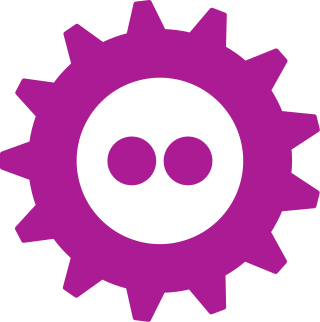
Free and Open source Software Developers' European Meeting (FOSDEM) is a non-commercial, volunteer-organized European event centered on free and open-source software development. It is aimed at developers and anyone interested in the free and open-source software movement. It aims to enable developers to meet and to promote the awareness and use of free and open-source software.
The Linux Desktop Testing Project (LDTP) is a testing tool that uses computer assistive technology to automate graphical user interface (GUI) testing. The GUI functionality of an application can be tested in Linux, macOS, Windows, Solaris, FreeBSD, and embedded system environments. The macOS version is named PyATOM, and the Windows version is Cobra. The LDTP is released as free and open-source software under the GNU Lesser General Public License (LGPL).
GNOME Foundation is a non-profit organization based in Orinda, California, United States, which works to coordinate the efforts in the GNOME project.

LinuxWorld Conference and Expo was a conference and trade show that focused on open source and Linux solutions in the information technology sector. It ran from 1998 to 2009, in venues around the world.
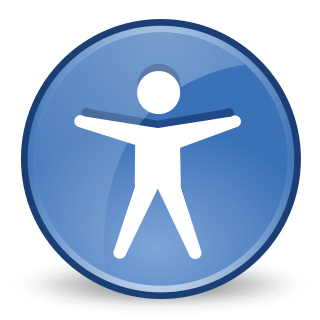
Accessibility Toolkit (ATK) is an open source software library, part of the GNOME project, which provides application programming interfaces (APIs) for implementing accessibility support in software.

Tracker is a file indexing and search framework for Linux and other Unix-like systems. It is written in the C programming language.
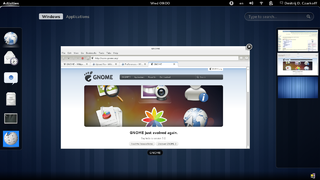
GNOME 3 is the third major release of the GNOME desktop environment. A major departure from technologies implemented by its predecessors, GNOME 3 introduced a dramatically different user interface. It was the first GNOME release to utilize a unified graphical shell known as GNOME Shell. It also introduced support for the Wayland display protocol and added integration with other key technologies such as Flatpak during its development lifecycle.

GTK is a free and open-source cross-platform widget toolkit for creating graphical user interfaces (GUIs). It is licensed under the terms of the GNU Lesser General Public License, allowing both free and proprietary software to use it. It is one of the most popular toolkits for the Wayland and X11 windowing systems.
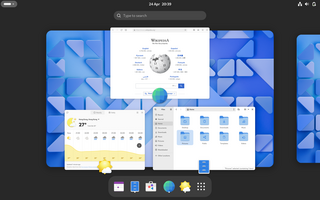
GNOME, originally an acronym for GNU Network Object Model Environment, is a free and open-source desktop environment for Linux and other Unix-like operating systems.
GNOME Project is a community behind the GNOME desktop environment and the software platform upon which it is based. It consists of all the software developers, artists, writers, translators, other contributors, and active users of GNOME. It is no longer part of the GNU Project.

Disk Usage Analyzer is a graphical disk usage analyzer for GNOME. It was part of GNOME Core Applications, but was split off for GNOME 3.4. It was originally named Baobab after the Adansonia tree. The software gives the user a menu-driven, graphical representation of what is on a disk drive. The interface allows for selection of specific parts of filesystem being scanned so a single folder, the entire filesystem, and even remote folders and filesystems can be scanned. The graphical representation can be switched between a ring chart and a treemap chart so the presentation can be tailored to the specific content being scanned.
The Desktop Developers' Conference was a Linux conference where developers discussed and worked on X11, Linux desktops like GNOME and KDE, FreeDesktop.org projects, and desktop software such as web browsers, office suites, and groupware. The conference took place in Ottawa, Ontario, Canada each year — just before the Linux Symposium conference — in 2004, 2005, and 2006.

GTK Scene Graph Kit (GSK) is the rendering and scene graph API for GTK introduced with version 3.90. GSK lies between the graphical control elements (widgets) and the rendering.

Outreachy (previously the Free and Open Source Software Outreach Program for Women) is a program that organizes three-month paid internships with free and open-source software projects for people who are typically underrepresented in those projects. The program is organized by the Software Freedom Conservancy and was formerly organized by the GNOME Project and the GNOME Foundation.
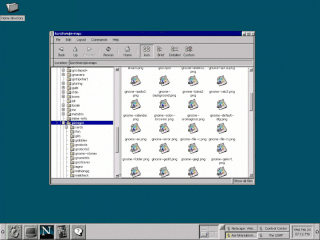
GNOME 1 is the first major release of the GNOME desktop environment. Its primary goal was to provide a consistent user-friendly environment in conjunction with the X Window System. It was also a modern and free and open source software alternative to older desktop environments such as the Common Desktop Environment (CDE), but also to the K Desktop Environment (KDE). Each desktop environment was built-upon then proprietary-licensed widget toolkits, whereas GNOME's goal from the onset, was to be freely-licensed, and utilize the GTK toolkit instead.















